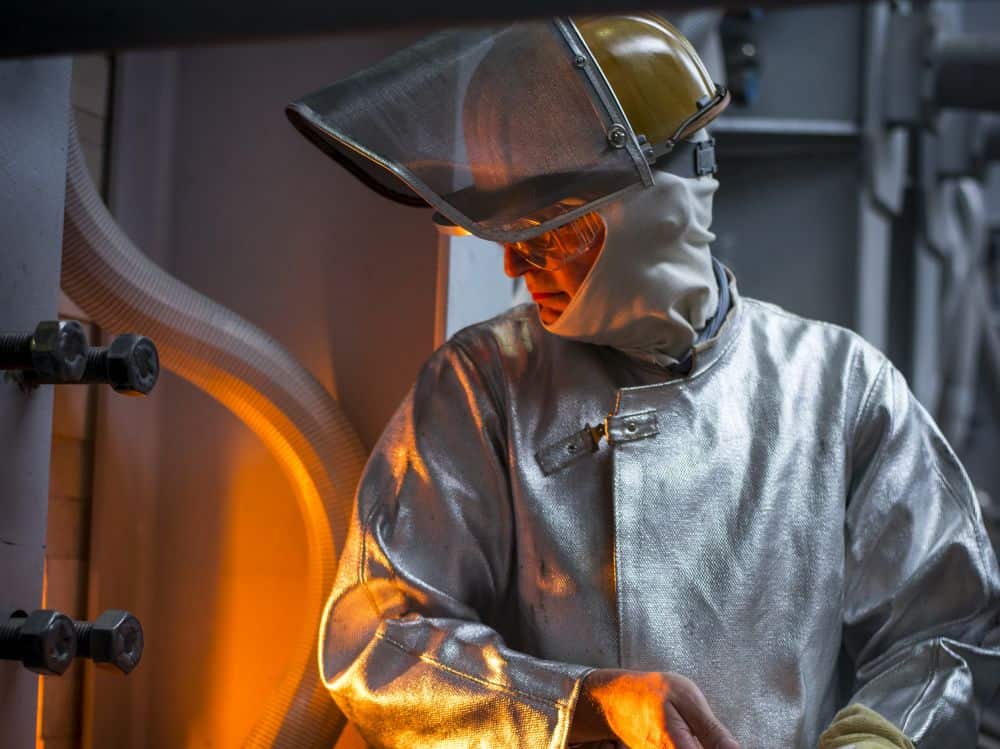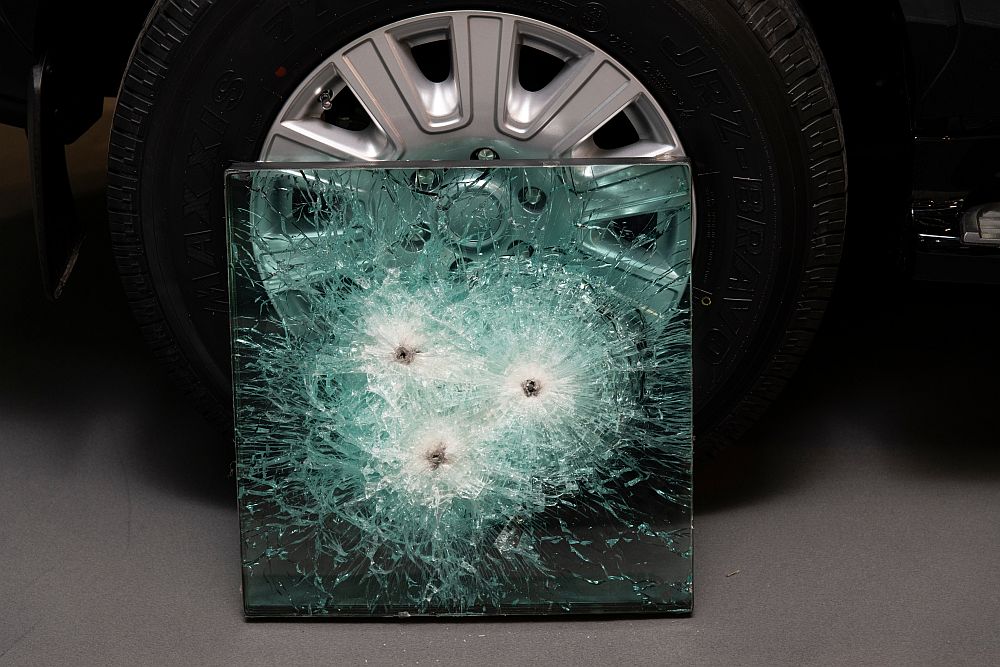
[Image above] SCHOTT successfully melted glass using 100% hydrogen combustion in laboratory tests, as reported in July 2023. Credit: SCHOTT
In the push toward a more sustainable future, much attention has been given to the electrification of different products, from automobiles to home appliances to heating systems. Yet electrification is not a feasible alternative for every application that relies on fossil fuels.
Take, for example, airplanes. Flights across the Atlantic or Pacific oceans require planes to travel for hours on end without stopping to refuel. But current batteries do not have the energy density necessary to power anything but the lightest planes—let alone a commercial airliner crossing a never-ending expanse of water.
Instead of electricity, hydrogen fuel is another approach to replacing fossil fuels that comes with several benefits. For example, hydrogen is significantly more energy dense than batteries, so hydrogen fuel cell technologies allow for longer driving—or flying—ranges and heavier payloads.
Additionally, while electrifying low-temperature heating applications (below 200°C) is easily done, direct electrification at high temperatures is not commercially viable. For high-temperature processes, then, manufacturers are eyeing hydrogen as a fossil fuel replacement.
Hydrogen combusts differently than other fuels, though, so manufacturers will need to develop new materials and parameters for fueling high-temperature processes with hydrogen.
In recent years, several glass companies have started experimenting with replacing natural gas with hydrogen in glass production. And the results from these tests, as described below, have been promising.
AGC (Japan)
In October 2023, AGC announced it had succeeded in a demonstration test of glass production using hydrogen as fuel. It was the company’s first time conducting tests using hydrogen in a production furnace.
The test, which was conducted with the support of Air Liquide Japan G.K., took place at the electronics float glass manufacturing facility of the Kansai Plant, Takasago Factory. AGC used this test to identify the technological issues that come with using hydrogen-fueled oxygen combustion technology in glass production.
AGC plans to conduct scaled-up tests of the combustion capacity of the hydrogen combustion burner and is considering demonstration tests at the AGC Group’s global sites.
HyNet Industrial Fuel Switching program (United Kingdom)
The HyNet Industrial Fuel Switching (IFS) program was a subset of the wider HyNet North West project, the United Kingdom’s leading project on industrial decarbonization. Led by Progressive Energy Limited in partnership with NSG-Pilkington, Unilever, and Essar, the HyNet IFS program aimed to demonstrate the feasibility of switching from natural gas to hydrogen in industrial settings.
The HyNet IFS program, which concluded in March 2022, consisted of three demonstration projects:
- On-site demonstration of hydrogen firing in a float glass furnace at NSG-Pilkington’s Greengate Works in St. Helens;
- On-site demonstration of hydrogen firing in a boiler at Unilever’s Port Sunlight plant; and
- A front-end engineering and design study in relation to a new hydrogen-fired gas turbine combined heat and power plant at Essar’s Stanlow Refinery.
During this program, in August 2021, a press release issued on the HyNet North West project website stated that the float glass tests at the St. Helens facility achieved the first-ever large-scale demonstration of 100% hydrogen firing in a live float glass production environment.
In June 2023, the U.K. government announced Phase 2 of the HyNet IFS program, which will explore the viability of using biofuels, electricity, and syngas in glass production.
Nippon Electric Glass (Japan)
In April 2022, Nippon Electric Glass announced it had conducted a successful glass melting test with 100% hydrogen combustion using a hydrogen–oxygen combustion burner jointly developed with Taiyo Nippon Sanso Corporation.
Saverglass (France)
In September 2023, the sustainable research and development department at Saverglass led the company’s first hydrogen trials at its hybrid furnace in Feuquières, France. The project team carried out tests on hydrogen injection at three different rates—10%, 20%, and 30%—and the results “confirmed Saverglass’ decision to use hydrogen to decarbonize its glassmaking process,” according to a Saverglass LinkedIn post.
SCHOTT (Germany)
In May 2022, SCHOTT announced the launch of a pilot project at its headquarters in Mainz, Germany, to test large-scale use of hydrogen in glass production.
In February 2023, the company reported successful trials using 35% hydrogen (65% natural gas) combustion for industrial-scale glass production. Then in July 2023, the company revealed it had succeeded in producing a test melt with 100% hydrogen combustion in the laboratory, i.e., without using any natural gas.
Saint-Gobain (Germany)
In January 2022, Saint-Gobain announced the launch of the COSiMa project, which aims to investigate the feasibility of using hydrogen for glass production.
The project is being carried out in cooperation with Saint-Gobain Sekurit Germany, Saint-Gobain Glass Germany, the Gas and Heat Institute in Essen, and the Institute for Industrial Furnace Construction and Heat Technology and the Institute for Power Generation and Storage Systems at RWTH Aachen University.
As part of the COSiMa project, in March 2023, Saint-Gobain reported it had successfully carried out a test production of flat glass using more than 30% hydrogen combustion at its Herzogenrath site in Germany. You can learn more about this test in the video below.

Credit: Saint-Gobain, YouTube
In addition to these trials, in May 2022, the German Glass Industry Association and the Essen Gas and Heat Institute announced the results from their joint HyGlass project, which investigated the use of hydrogen in regenerative glass melting tanks.
While the results were overall positive, the report noted that use of hydrogen indirectly leads to changes in the glass quality, such as discoloration. To prevent this effect, the composition of the glass mixture could be adjusted.
In the future, another significant hydrogen project is scheduled to begin full-scale trials in 2025. The European Union-funded H2GLASS project will conduct tests at both glass and aluminum facilities. But the glass companies involved in the project are
- NSG-Pilkington (Greengate Works in St. Helens, U.K.)
- Owens Corning (Laudun l’Ardoise, France)
- Steklarna Hrastnik (Hrastnik, Slovenia)
- Vetrobalsamo S.p.A. (Sesto San Giovanni, Italy)
- Zignago Vetro (Fossalta di Portogruaro, Italy)
More updates on the glass industry’s investigations of hydrogen firing will be presented next week during the 84th Conference on Glass Problems, which takes place in Columbus, Ohio, November 6–8.
Update 11/10/2023 – Video about the COSiMa project now links to Saint-Gobain’s YouTube page rather than Air Products.
Author
Lisa McDonald
CTT Categories
- Energy
- Glass
- Manufacturing


